
Alexander Golts wrote a wrap-up for the first week in May called "A Soviet Man in the Postmodern Era". It was first published in
Yezhednevnyj Zhurnal, but I can't find it on their website, so here's a link to a
reprint at Dvizhenie vmeste (Moving together)'s site. It's a pretty biting look at the tandem's takeover of Russia's holidays (including a jab at how the country's honor, so important on Victory Day, doesn't suffer from having so many WWII vets homeless, or as good as), and it has some nice cultural bits for translation students to wrestle with, as well as some syntactic puzzles. Here are two very different things my students struggled with.
First, this description of Putin and Medvedev having a drink with some "ordinary people":
И как апофеоз — тандем возглавляет демонстрацию, типа сливается с народом. Казалось бы, чистое возвращение в СССР, полный ренессанс советской эстетики. Однако все это носило привкус постмодернизма. Слияние с народом продолжилось с пивбаре «Жигули», где компанию тандему составил знатный рабочий со своими знаменитыми варежками.
And as the apofeoz - the tandem led the demonstration, as if 'mingling with the people'. It would seem a perfect return to the USSR, a total rebirth of the Soviet esthetic. However, it all had a little tinge of postmodernism. The mingling with the people continued at the Zhiguli beer bar, where the tandem was joined by (the/a) distinguished worker with his celebrated gloves.
There's a word problem - or a couple. First, апофеоз. Given older Russian F-for-TH, and the loss of the end of Greek words (Pegasus is
Pegas, for instance),
apofeoz sure looks like "apotheosis", and that is its first meaning. But that doesn't fit the context. If you look in a Russian defining dictionary, you'll find out it also means a "grand finale". The second was cultural - tandem. That term (a masculine, singular noun)
 always
always refers to the team of Putin & Medvedev. (There's even a word -
tandemokratija, rule by the tandem.) Key to its meaning is that a tandem is a team in which one member is in front of the other - like a tandem bicycle.
There was a troubsome phrase - компанию тандему составил (kompaniju tandemu sostavil) - which is one of those things you just have to learn as a unit: составить кому-л. компанию, to join someone, to go along with someone, to keep someone company. Word order was tricky, because the Russian was
company to-tandem kept worker, and that sort of thing always throws students (especially when they aren't sure who the tandem is!).
The third problem was purely cultural. Who was it that joined them at the bar?
"The distinguished worker with his famous gloves" - most of them got that far (one lost track of who свой was referring to (it's a possessive that goes to the subject and is obligatory in third person - preventing confusion in sentences of the
Tom gave John his book variety - his is a different word depending on whose book it is), and one was led astray by a slang meaning for варежка - mouth. The problem was they didn't realize that this had to mean a specific person.
But if you read that someone was joined by (a/the) "famous singer with his

celebrated single glove" or (a/the) "famous gangster with his trademark white fedora", you'd realize you were meant to know who that was. And Russians know who this guy is: Valery Trapeznikov, a "simple working man, like YOU" from Perm, a lathe operator who is also a Duma deputy (equivalent of a congressman), whose machinist's gloves are indeed his trademark.

Then there was this tricky bit, simpler at first glance - but not at second:
Главным же событием праздника стал белый медведевский плащик.
The highlight of the holiday was white medvedevsky raincoat.

The first problem here is the word медведевский
medvedevskij. It doesn't really mean "bear" - that's медвежий
medvezhij. But it's from the same word - Медведев is a surname that's identical to the genitive plural of
bear, and the collocation белый медвед
belyj medved means "polar bear" - hence (adding Russia's lack of articles) the caption of that picture at the top: "Mooom, who's giving this speech?" "President [Medvedev / of the bears]." "And which bears - polar or brown?"
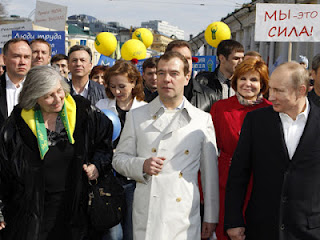
But this doesn't mean a polar bear coat, or a polar bear's coat - it means
Medvedev's white raincoat. It doesn't help that Russian doesn't capitalize proper adjectives (American, Moscow, Jeffersonian -in Russian, all are with small first letters). The hardest thing to deal with is the word order: in English, a possessive is a determiner and comes first; in Russian, it's just another adjective, and it comes after adjectives of color or quality... We don't say "white Medvedev's raincoat".
All in all, a nice article for intermediate level translators from Russian to work on. A lot of different things in it.
Labels: Russian, translation








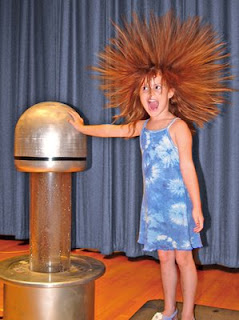

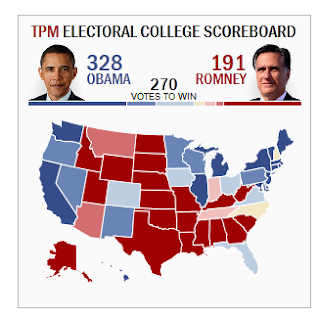

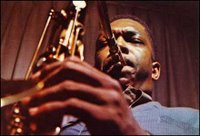





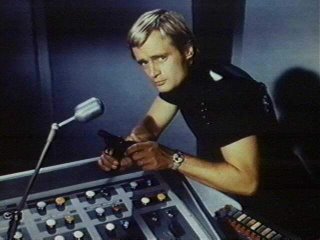

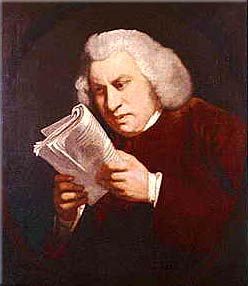

















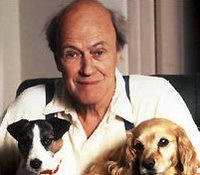



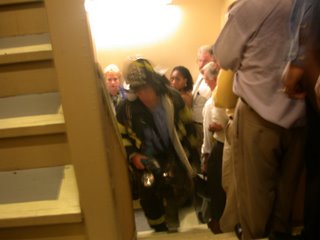
































































4 Comments:
-
At 12:53 AM, October 07, 2012
 Adrian Morgan had this to say...
Adrian Morgan had this to say...
-
-
At 1:40 AM, October 07, 2012
 The Ridger, FCD had this to say...
The Ridger, FCD had this to say...
-
-
At 9:09 AM, October 07, 2012
 Adrian Morgan had this to say...
Adrian Morgan had this to say...
-
-
At 9:57 AM, October 07, 2012
 The Ridger, FCD had this to say...
The Ridger, FCD had this to say...
-
-
<-- Older Post ^ Home Newer Post -->I hated the Doctor Who mid-season finale. Actually, Season Seven as a whole has been pretty terrible, which is particularly disappointing given that Season Six was easily the best since the show was revived.
I only had a few reservations about Season Six. One, it made no sense that River could regenerate -- the TARDIS has enough magic powers already, and letting it bestow regenerative powers upon an unborn human baby just comes across as making a mockery of itself. Two, "Closing Time", with its ridiculous notion that a crying baby could prevent cyberneurosurgery. I hate that kind of stupid sentimentality in a plot. Plus several lesser reservations, such as misuse of the word "psychopath". But overall, two major reservations plus several lesser ones counts as an excellent score.
Season Seven has disappointed more often than not. Take the episode with the cubes -- it built up lots of suspense, but seconds after we learn who the villains are, the Doctor waves the sonic screwdriver and the whole world is fixed. And now, the mid season finale -- several scenes offended me, not least of which was the Doctor healing River's hand. The Doctor has never been able to heal wounds by willpower (otherwise it would be a VERY different show) but they put that in merely for the sake of some sentimental lines of dialogue.
As Tom Baker once said, "I always have major reservations."
I expect that Moffat thinks River is the only person (except perhaps another Time Lord) he could heal. I have serious reservations about River all the way around, so I try not to judge eps with her in them too harshly. I rather liked The Power of Three, myself ... but I had some plot problems with The Angels Take Manhattan - perhaps most strongly with (a) how and why did Rory end up taken the first time; (b) did we know the Angels could inhabit other statues, like giant hollow ones? (c) how the hell does Liberty ever not have eyes on her? and finally (d) did we ever know the Angels sent people back in time? Plus, of course why can't the TARDIS land in New York again? But I forgive it all for the gorgeous character moments, especially Amy's choice to risk everything for a chance at Rory.
I think perhaps a disadvantage of season arcs (as they tend to do a lot of in the new series) is that a deficiency in plotting can infect the whole season, whereas in classic Doctor Who, there were at least as many bad stories, but each adventure was relatively isolated so in a sense it didn't matter. One remembers the stories one likes.
As for your points above, I agree with (b) among others, but the answer to (d) is "yes" -- that angels could send people back in time was established in "Blink", the very first Angel story.
Now I come to think of it, you're right about "Blink". I'd forgotten just what they did to you when they caught you.
Post a Comment
Subscribe to Post Comments [Atom]